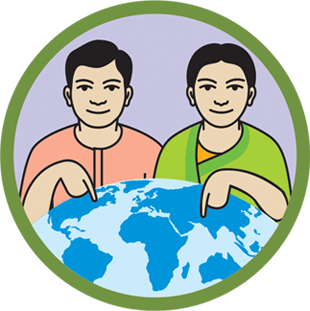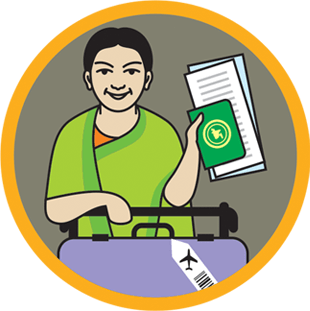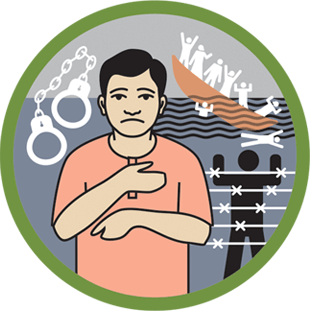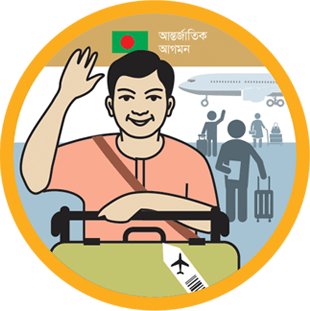The following are examples of options or pathways towards safe, regular and orderly migration:
Labour migration
Labour migration refers to the formal employment of workers for work abroad, generally done through recruitment and placement agencies or overseas employment promotion. The recruitment and deployment can be a product of bilateral arrangements between governments, between governments and private sector, or between industries.
Highly-skilled migration
It is a part of labour migration that focuses on the employment of highly skilled migrants in order to fill a gap in the needed human resource of a certain country. Highly-skilled migrants are often provided with higher salaries compared to regular labour migrants, have the privilege to acquire permanent residency status in the host country compared to having a limited work visa, can bring their immediate family members with them, and can potentially acquire citizenship of the host country upon compliance with certain qualifications. Currently Bangladesh sends high skilled migrants in Japan and korea every year with high paid salary and opportunities.
Family reunification
Family members who have become permanent residents, emigrants or citizens of another country can petition or sponsor qualified family members for migration. This could be the spouse, children, parents or siblings. Very specific qualifications and processes are imposed by host countries to allow for family reunification.
Permanent residency
Permanent residency refers to the status provided to select migrants such as those under family reunification or highly-skilled migration that allows them with more rights and privileges in the host countries such as longer stay, seek employment and a pathway towards acquisition of new citizenship.
Emigrant worker model
Emigrant worker model previously used in select Commonwealth countries where migrants with specialized skills (which depends on the market and needs of the country) offers 6 months to one year of visa to allow migrants to stay in the country and look for employment. Once they are able to secure an employment, they will be provided with a longer and more secure work visa which can also lead to permanent residency or acquisition of citizenship after a certain period.
Trainee model
Trainee model modality utilized by select countries of hiring trainees or apprentices, instead of hiring regular migrant workers to augment gaps in the human resource need of the receiving country. The qualifications are not as rigid or comprehensive compared to a regular migrant worker, but the compensation and salaries are also less, yet the nature of work is almost the same as that of a regular worker. After the traineeship or apprenticeship, the workers can be formally hired as regular migrant workers after complying with some requirements. Please be mindful and cautious of the trainee model because it is sometimes used by illegal recruiter to recruit people by evading regular processes and requirements.
Educational purposes
The specific purpose for migrating to other countries is for education, either long term such as taking advance studies or short term such as enrolling in certificate courses or training. The general rule is that you have to return to your home country after the completion of studies. However, some scholarship grants in select countries offer the scholar one year of stay in the host country after studies to look for and avail of employment, which could lead to labour migration, highly skilled migration or permanent residency. Other options are to immediately seek employment after studies, and when successful, apply for a working visa by going through the regular process under labour migration.
Regularization of stay or grant of amnesty
Through negotiation between origin and destination countries, or through changes in policies or laws of host countries, or through grant of pardon or amnesty, irregular migrants can regularize their stay abroad through compliance with the requirements such as payment of fees (which is often way lower compared to a regular fine or penalty for irregular stay).
Au pair
An au pair is an unmarried young adult aged 18 to 30 years, who has no children and travels to a foreign country for a defined period of time to live with a host family. The au pair is considered as a full member of the family during the entire stay. As such, he or she helps the family with childcare and can be asked to assume some light household tasks. In return, the host family provides free board and lodging, as well as pocket money. However, the au pair is neither a housekeeper, nor a nanny. The main purpose of the au pair placement is a cultural exchange, which gives the au pair an opportunity to improve his or her language skills. For this reason, child minding in your own country is not considered an au pair stay. The au pair should also attend a language course in the host country. He or she should, however, have some basic language skills beforehand. Whether it is the au pair or the host family who pays for the language course depends on the prevailing practice of the relevant host country. The same applies to the cost of travel and insurance. Be cautious and mindful of recruitment agencies that facilitate au pair for a fee as this is not one of their authorised activities. Au pair can directly apply with host families and need not pass through a recruitment agency.
Marriage migration
A person engaged or married to a citizen of another country can apply for a fiancée or spouse visa to such country, which can lead to permanent residency or citizenship. In some countries, there are specific restrictions or requirements related to marriage migration such as Anti-Mail Order Spouse which prohibits, among others, the act of facilitating marriage for a fee or remuneration. It could also be one of the acts of trafficking if done with deceit, fraud, abuse of authority or vulnerability, etc. Exercise caution and avoid recruiters who promise migration through marriage, especially those who ask or receive a fee for such purpose, since marriage migration need not be coursed through an agent or conduit or facilitator. Be cautious also of online or IT-based marriage matchmakers.
Other visa options such as T visa for victims of trafficking
T non-immigrant status is a temporary immigration benefit that enables certain victims of a severe form of human trafficking to remain in the United States for up to 4 years if they have assisted law enforcement in an investigation or prosecution of human trafficking. T nonimmigrant status is also available for certain qualifying family members of trafficking victims. T nonimmigrants are eligible for employment authorization and certain federal and state benefits and services. T nonimmigrants who qualify may also be able to adjust their status and become lawful permanent residents (obtain a Green Card). Other countries that offer similar visa options are Canada, Northern Macedonia, Italy and The Netherlands.










